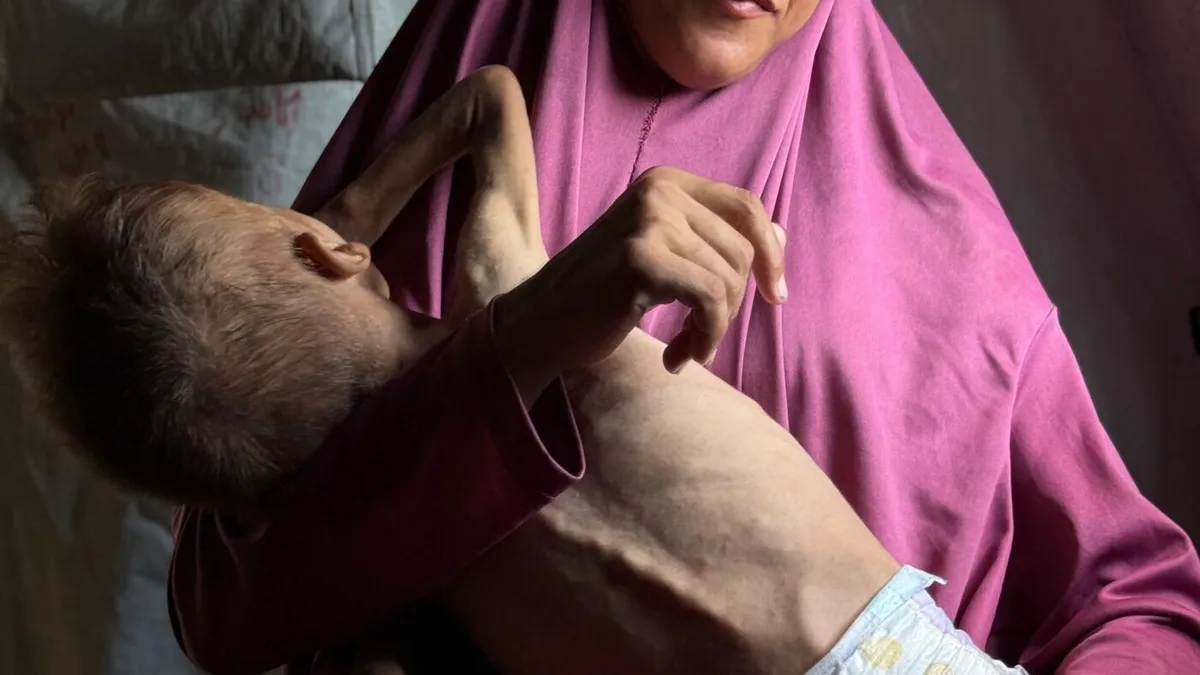
In a makeshift tent by the shores of the Mediterranean Sea, Hidaya Al-Motawaq cradles her crying baby boy, Mohammad, desperately trying to soothe him. "Khalas, khalas," she whispers, meaning "enough, that's enough." At just a year and a half old, Mohammad's frail body shows the signs of severe malnutrition; his eyes are sunken, his stomach swollen, and his spine sharply visible beneath his thin skin. Al-Motawaq, a 30-year-old widow, struggles to provide nourishment for her children, including her five-year-old daughter, as she herself is malnourished. She has searched tirelessly from hospital to hospital for food or milk, only to be met with empty hands and closed doors.
The last remaining pediatric ward in Gaza that treated malnutrition closed down earlier this month due to a critical shortage of food and medical supplies. With no options left, Al-Motawaq cradles Mohammad constantly, brushing his thinning hair, knowing that he needs food, yet all she can offer is water. This heartbreaking situation is not unique; nearly 1 million children, making up about half of Gaza's population, are facing similar fates. Medical professionals and aid workers warn that chronic malnutrition is causing irreversible damage to the health of children like Mohammad across the region.
Dr. Ahmed Al-Farrah, head of pediatrics at Nasser Hospital in southern Gaza, emphasizes the grave implications of this conflict on children under three years old, stating that this critical period is essential for the development of their central nervous system. The United Nations has issued dire warnings about potential mass starvation in the enclave, attributing the crisis to Israel's restrictions on humanitarian aid entering Gaza. In response to international pressure, Israel’s military announced a daily 10-hour pause in fighting to facilitate the delivery of food and other essential aid to heavily populated areas such as Gaza City and Deir al-Balah.
While Israel claims to be allowing aid deliveries, the situation remains perilous, with accusations that Hamas is obstructing aid distribution. The U.N. food security experts previously warned that one in five people in Gaza is at risk of starvation. Health authorities in Gaza report that over 130 individuals have died from starvation and malnutrition-related causes since the onset of the war in October 2023, with six more reported in just the last 24 hours.
Despite the alarming statistics, a formal declaration of famine has not been made in Gaza due to stringent international criteria. However, medical professionals are acutely aware of the devastating impact of prolonged hunger on children. Dr. Mohammed Mansour, senior nutrition manager in Gaza with the International Rescue Committee, notes the increasing rates of stunting among children, revealing that one in three individuals are going days without food. The United Nations estimates that approximately 100,000 women and children in Gaza are severely malnourished and require immediate medical intervention.
Even if these severely malnourished children survive, Dr. Al-Farrah warns that they may face long-term neurological impairments caused by starvation, including ADHD and difficulties in learning and communication. Kate Phillips-Barrasso, a vice president at Mercy Corps, highlights the severity of the situation, stating that the extensive damage may be irreversible even with increased aid. Despite Israel's assurances of food aid through the Gaza Humanitarian Foundation, many Palestinians have tragically lost their lives while trying to secure food.
As the humanitarian crisis deepens, the search for food has become a daily struggle for families. Salwa Shamali, a 20-year-old older sibling, describes her family's relentless routine to secure basic necessities. The search for fresh water starts at dawn, followed by attempts to find food from local charities and markets, often returning empty-handed. Hidaya Al-Motawaq's world, confined to a tent by the sea, revolves around her two children, Mohammad and his sister, as she fights to keep them alive in an increasingly desperate situation.
The future remains uncertain for the people of Gaza, as negotiations for a potential ceasefire continue to stall, leaving families like Al-Motawaq's in a state of despair. The ongoing conflict and humanitarian crisis pose significant challenges to survival, as the children of Gaza face a harrowing reality that threatens their very existence.
Contributions to this story were made by Abu Bakr Bashir from Sheffield, England, and Ahmed Abuhamda from Cairo.